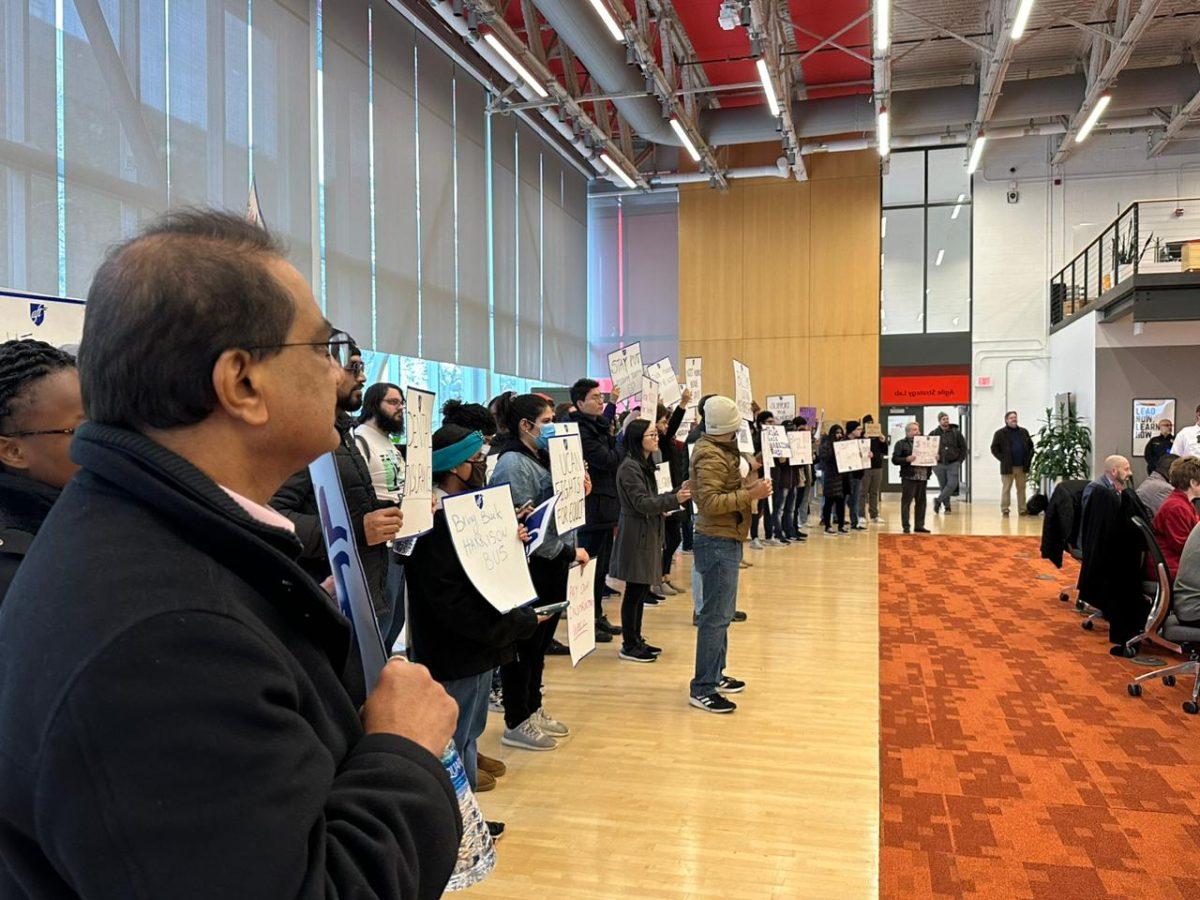The United Council of Academics at NJIT, known as UCAN, held a rally at the Board of Trustees meeting on Nov. 17 in order to publicly demonstrate that NJIT needs to begin bargaining with UCAN’s membership. NJIT has thus far failed to acknowledge UCAN’s elected leadership and has been stalling negotiations, instead trying to diminish members’ voices. Meanwhile, critical items like healthcare fees for doctoral student workers, pay raises, and benefits for all UCAN workers go unaddressed.
NJIT has made great strides in increasing its status among research-focused universities. It is now an R1 institution, classified with the highest level of research activity, and climbs higher annually in ranking lists from publications such as Forbes, U.S. News, and World Report. These gains are no doubt due to the efforts of NJIT’s instructors and researchers.
Yet educational and research employees are struggling. Rising housing, food, healthcare, and transit costs have put NJIT’s lowest-paid academic workers on welfare.
Some adjunct instructors, many of whom teach foundational courses, must work additional jobs to make ends meet. Doctoral workers, who assist in both research and teaching, are effectively paid below minimum wage. Postdoctoral employees, early-career scientists doing much of the academic grunt work, are set to be hit with large healthcare cost increases.
For adjunct, doctoral, and postdoctoral workers, wages were low even before the pandemic and associated inflation. For doctoral students, the salary is only $25,500 per academic year with a mere $3,000 for the nearly four-month-long summer. Summer pay is so low that some doctoral students must use food banks; otherwise, workers and their families use welfare programs to stay afloat.
Due to visa restrictions, however, international students cannot receive welfare and are not legally allowed to pursue side jobs such as tutoring. Adjunct instructors make only $1,850 per credit, so a typical three-credit course pays only $5,550 for the semester. NJIT considers this a major concession to adjuncts — after refusing to give them a pay raise for 12 years!
Many adjuncts work multiple jobs, including teaching at other universities. All this is happening at an institution where the average administrator makes nearly $100,000 annually, whose ex-president was the second highest paid public university president in the state, where tuition continually rises for undergraduate and graduate students, and where tens of millions of dollars were provided by the federal government in COVID-19 relief funds, according to open payroll records and New Jersey Spotlight News.
This is not the norm for other schools. Just across the street, Rutgers-Newark, an R2 institution with a lower research ranking, pays doctoral students $32,000 for the academic year with proportional pay for the summer.
The wages quoted above are technically minimums. However, NJIT pays only the minimum for teaching assistants, effectively making these the maximum wages for these employees. The best a doctoral employee can get — no matter how qualified they are or how hard they work — is an unlivable wage.
However, the situation gets worse. Did you know that NJIT does not provide any healthcare coverage for adjuncts? When the university changed to online instruction, adjuncts were mandated to come to campus. Not only did NJIT force adjunct instructors to risk infection, but also refused to provide healthcare coverage.
Doctoral students have bare-bones health insurance which does not cover dental or eye care. In the past, NJIT paid the entire insurance premium for this coverage. Now, NJIT refuses to pay the entire premium, instead pushing this cost upon doctoral students. Postdoctoral workers are insured through a state employee policy rather than through NJIT, but are expecting an 18% cost increase next year.
What are adjuncts, doctoral, and postdoctoral workers doing about these issues? Organized under UCAN — a labor union run by and for these workers — they are currently pushing for these issues to be addressed in a new employment contract. NJIT, however, has rejected requests for bargaining.
UCAN has been adamant about allowing workers to view and participate in bargaining sessions, and NJIT has instead been making false claims about our union’s structure and elected leadership and stalling negotiations.
It’s no wonder why. Management does not want the NJIT community to see the unfair proposals on the bargaining table. In the few sessions that have been held, NJIT management has repeatedly interrupted us and told us how we ought to use our speaking time.
Adjuncts, doctoral and postdoctoral workers all care about NJIT, but administrators continue to exhibit behavior that is causing employees to suffer. If the university is serious about continuing to be a top research institution, then it must provide compensation and benefits to the workers who make it possible and bargain a contract in good faith.
NJIT works because we do! To get involved with UCAN, please fill out https://docs.google.com/forms/d/e/1FAIpQLSeBQ_fIsC9Xm97OmiRk2cH-21o_6EAbx-ShcuxlKG1KIo_1ww/viewform.
Harty is UCAN’s executive-at-large and a mathematics Ph.D. student at NJIT.
O’Donnell is UCAN’s president and a physics Ph.D. student at NJIT.
Kothari is an adjunct in NJIT’s mechanical and engineering department and a founding member of UCAN.
Jones is a postdoctoral researcher in the biomedical engineering department at NJIT.




























